L.A.’s restaurants are barely hanging on. They hope to see you on the other side

- Share via
There was word earlier in the day that they’d be shutting down the bars. Many braced for what seemed imminent: Restaurants were next.
When L.A. Mayor Eric Garcetti made the announcement to shut down dine-in service at all city restaurants and bars, it was “a gut punch on a Sunday night,” said Sang Yoon, chef and owner of Father’s Office and Lukshon.
It was the latest body blow in a combination of hits L.A.’s dining scene has suffered in the past several weeks (for some, even longer). So much has been going wrong, at all times it seems. The coronavirus pandemic has ripped the city’s restaurants off their moorings, and there has been no time for anyone to adjust.
In the days leading up to Garcetti’s emergency action, as concern spread and the virus spread even more quickly, many restaurants took to social media to announce dramatic changes to their day-to-day operations. They had to consider their role and responsibility to keep their staff and communities safe, many explained.
“Hayato is perhaps the smallest restaurant in the city, and we seemingly have a minuscule chance of spreading this virus when we only serve seven guests per night,” wrote chef-owner Brandon Go, who employs three employees at his downtown kaiseki restaurant. “But Hayato is also part of a community.”
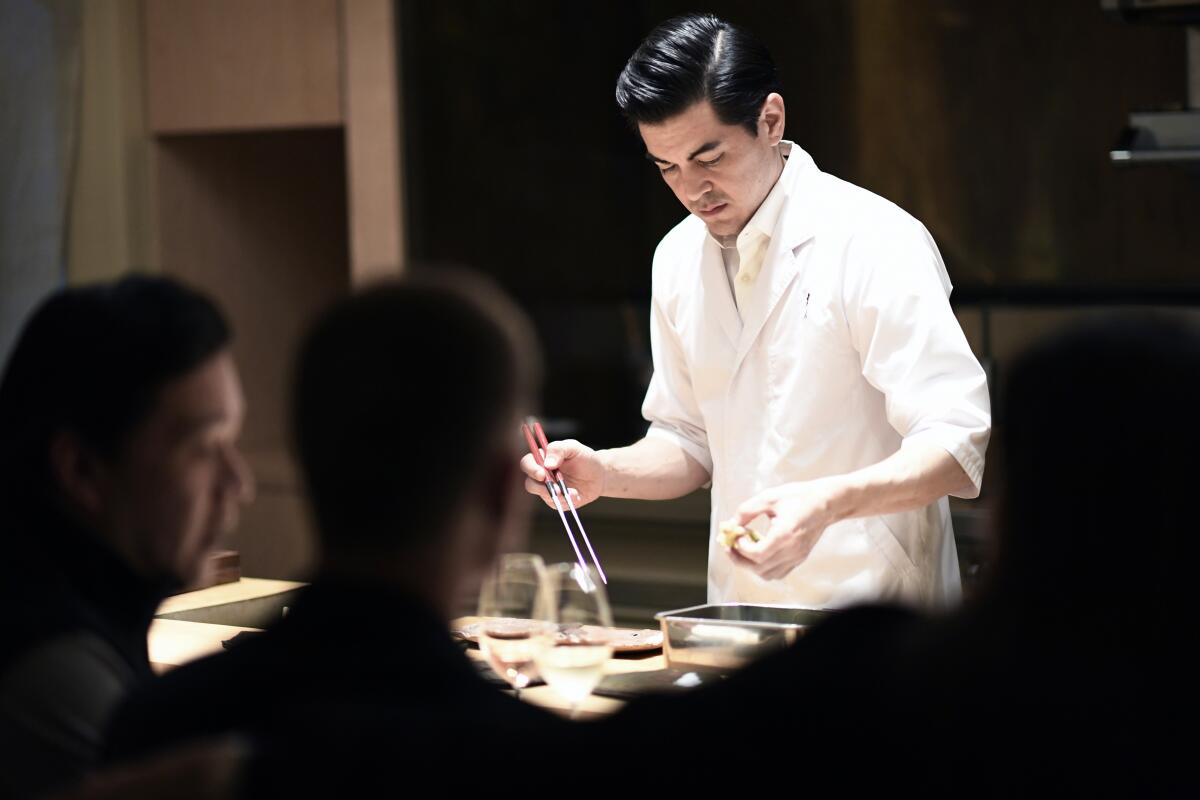
Go’s post took as abrupt and as just a turn as many of L.A.’s restaurants have done this week.
“I believe that right now it’s important to acknowledge that not everyone will be fine. It seems very easy for some people to say that for the good of the country it’s our responsibility to ‘flatten the curve,’” Go went on to write. “Flattening the curve by closing down businesses means taking away people’s jobs. People are going to starve.”
“The lasting implications after this may not be temporary,” Yoon said. “Some of these closures might be permanent for a lot of places.”
At Antico, chef Chad Colby’s immediate focus is on his staff and how he is to keep some semblance of his restaurant up and operating in East Larchmont Village, the neighborhood he and his first solo venture — “an ode to the rustic culinary traditions of the Italian countryside” — have called home for the past nine months. He’s not yet set up for delivery, but the restaurant is accepting takeout orders and recently introduced its pop-up, pickup restaurant, Antico Focacceria & Ice Cream. He’s also considering cook-at-home kits for families of four.
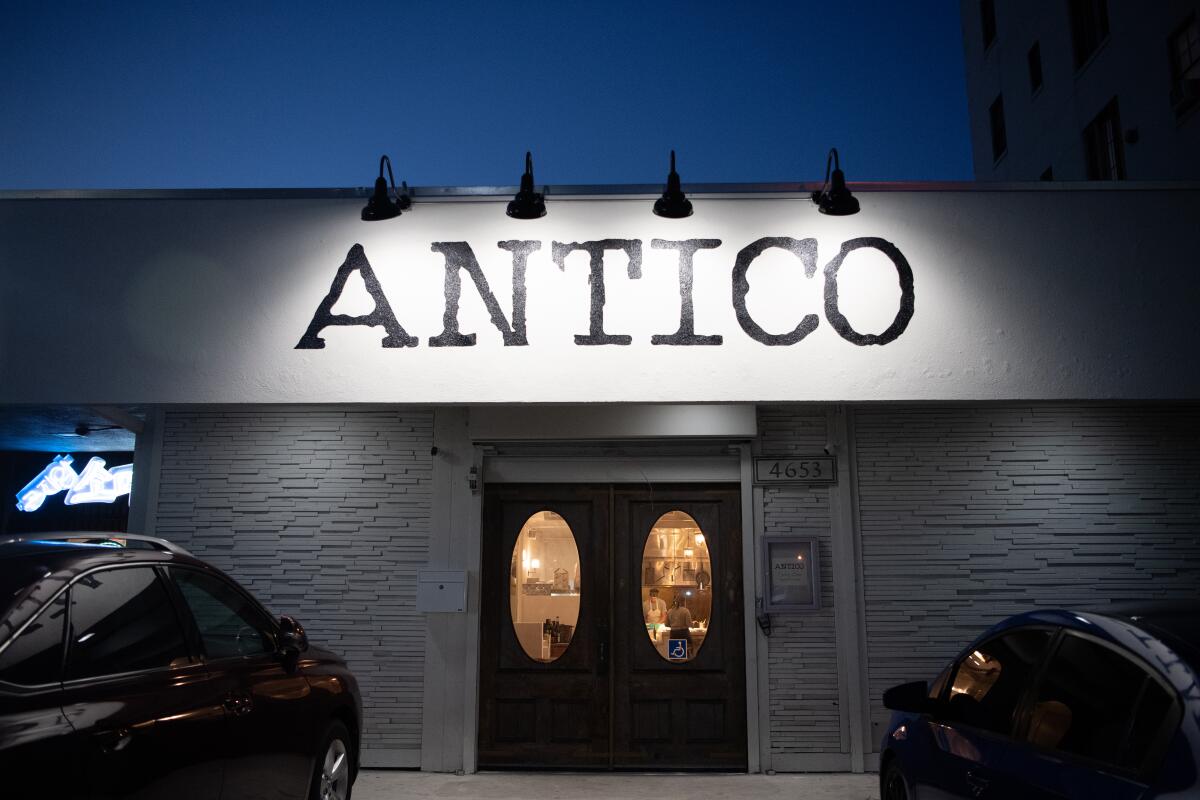
“We’re going to try every possible way that we can to — at this point, not make money, at this point just to keep this business going,” Colby said. “Any income that we try to do right now isn’t even necessarily to break even, it’s to sustain the losses that are going to be coming.”
To project how long any restaurant is to endure these unprecedented circumstances is a grim (and painful) projection.
Many restaurants aim to operate on 21-day terms: They receive their produce, meats, dry goods and other supplies, and pay for them three weeks later, theoretically, with the money they’ve earned in sales, Colby said.
But there are hardly any sales to support their businesses.
“We can still anticipate three weeks’ worth of bills that are going to be hitting us,” Colby said. “No sales on top of rent, on top of utilities, on top of everything from third-party companies.”
Yoon operates on a larger scale, employing 200 people across his four L.A. restaurants: He has Father’s Office locations in downtown, Santa Monica and Culver City, also home to Lukshon.
“At least I have a company that is a reasonable size. I’m sure there are companies that have more than a couple of restaurants that might be able to tolerate this — maybe — but if you’re a small place, one restaurant, that might be a different story,” he said. “That’s going to be the tough part. Even if you go to zero staff, your rent’s still due.”
Rent isn’t an issue for Niki Nakayama and Carol Iida-Nakayama of n/naka because they own their building. But that doesn’t mean they are spared the same bleak calculus that other chefs and restaurant owners have had to accept.
“We haven’t crunched hard numbers yet. We’re not worried about ourselves. We’re worried about how to pay our employees,” Nakayama said.
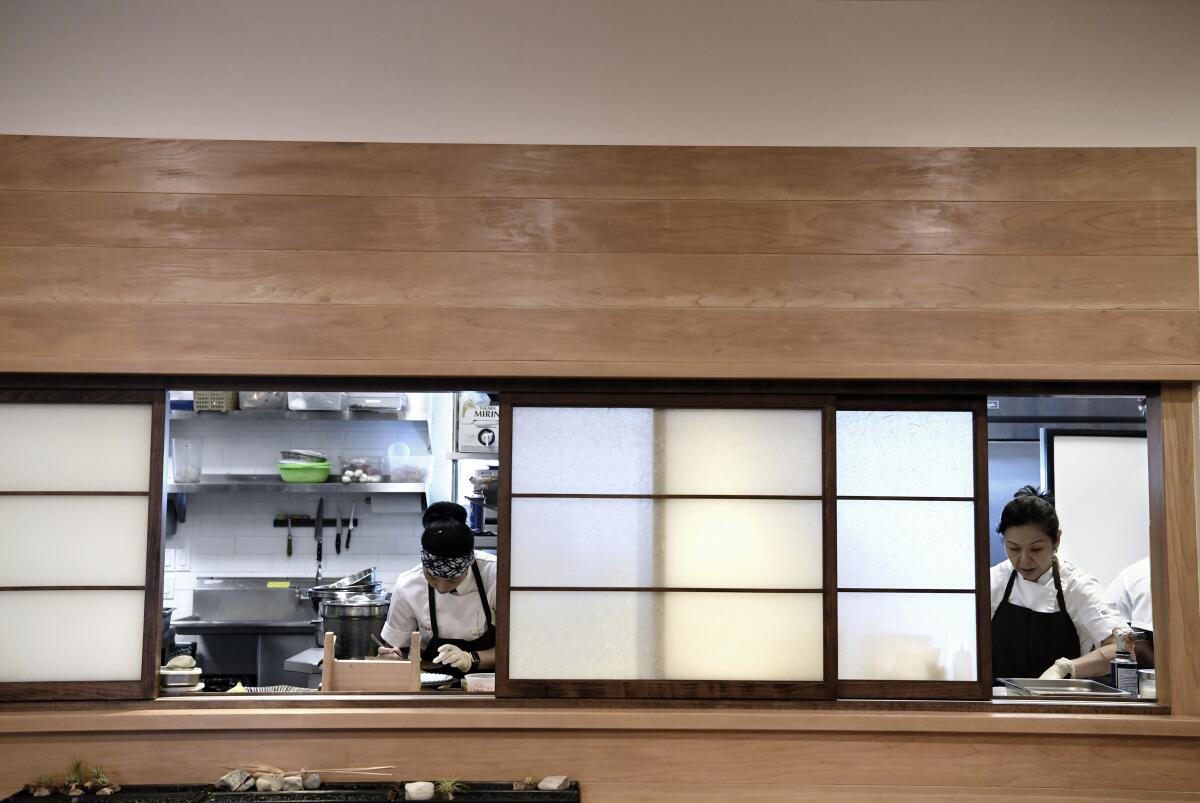
Some restaurants have already had to make swift and difficult decisions during the pandemic.
Dave Beran employs about 35 people at his two Santa Monica restaurants, Dialogue and Pasjoli. At Pasjoli, which opened in September, Beran said, “Ultimately we will probably have to lay people off. I don’t know that there is a way around it.”
“We’re too new of a restaurant. We don’t have the cash reserves,” Beran said. “It’s such uncharted territory for us. You can only pivot the business so much before it’s not the business anymore.”
Josef Centeno, chef-owner of Bäco Mercat, Bar Amá and Orsa & Winston in downtown and Amacita in Culver City, preemptively transitioned all his restaurants to takeout and delivery on Friday.
He has 140 employees under his employ. He’s paid out all sick pay, cut his managers’ salaries and has had some salaried managers running to-go operations. But, he said, the model is not sustainable.
“We’ll be completely out of money in like a week and a half,” Centeno said.
Chase and Chad Valencia, co-owners of Lasa in Chinatown, closed their restaurant Saturday evening, after days of deliberation. Chase Valencia said he had hoped Lasa would be shuttered for only a week. But even as he’s transitioned operations to delivery service as quickly as possible, there isn’t enough work to spread among his 15 employees to maintain full-time employment.
“I just don’t see how our restaurant can make it through the next two weeks,” he said, adding that his worst fear was that Lasa would not be able to reopen after the lockdown, however long it lasts. “It means I’m not going to be a restaurant owner anymore. My brother and these people who dedicated their lives to this place are going to be out of jobs. Our livelihood and the livelihood of our staff is being taken away.”
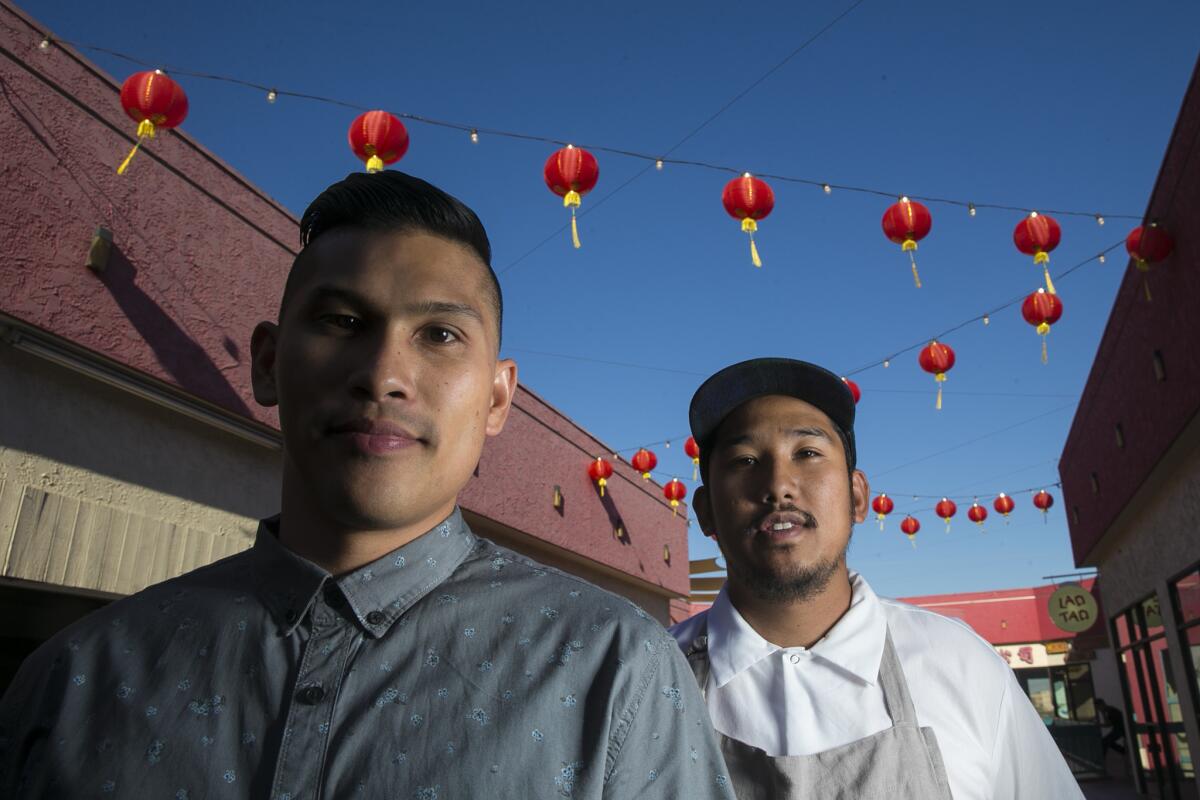
Colby said most restaurants try to abide by a rule to keep twice the amount of payroll in their working capital. He employs 22 people at Antico, a mix of salaried and hourly workers. He’s so far managed to hold onto all of them.
“We’re looking into how best to take care of our team,” said Colby. He, like many chefs, would like to see a financial package aimed at assisting restaurants and food service workers affected by the pandemic.
“We just hope there is a bailout for us like there has been for banks, for the airline industry and seemingly now the cruise-ship industry. Everyone seems to be getting bailed out but small businesses,” said Bricia Lopez, owner of Guelaguetza, the landmark Oaxacan restaurant in Koreatown and a manager of 93 employees.
Kuniki Yagi of Pikunico at the Row DLTA has seven employees, all hourly. She’s converted her restaurant to takeout and delivery only, though she doesn’t know for how long. She has to review financials with her business partners, she said, and wants to be able to support her staff anyway she can.
“Do they have enough food at home?” she said. “I worry and don’t know if they’ll be OK. I do want to personally reach out to them to make sure I do anything I can do. I’m going to give anything in the restaurant — groceries, the rice, the bread in the freezer. That’s totally doable for me. I don’t have a lot of cash but I can do such things.”
The welfare of her 45 employees has occupied much of Jennifer Feltham’s headspace as well. Together with partner Teodoro Diaz-Rodriguez, she co-owns Sonoratown in downtown Los Angeles. Her front-of-house workers will no longer see the tips they relied on, so she’s connected with friends in retail to try to find them second jobs.
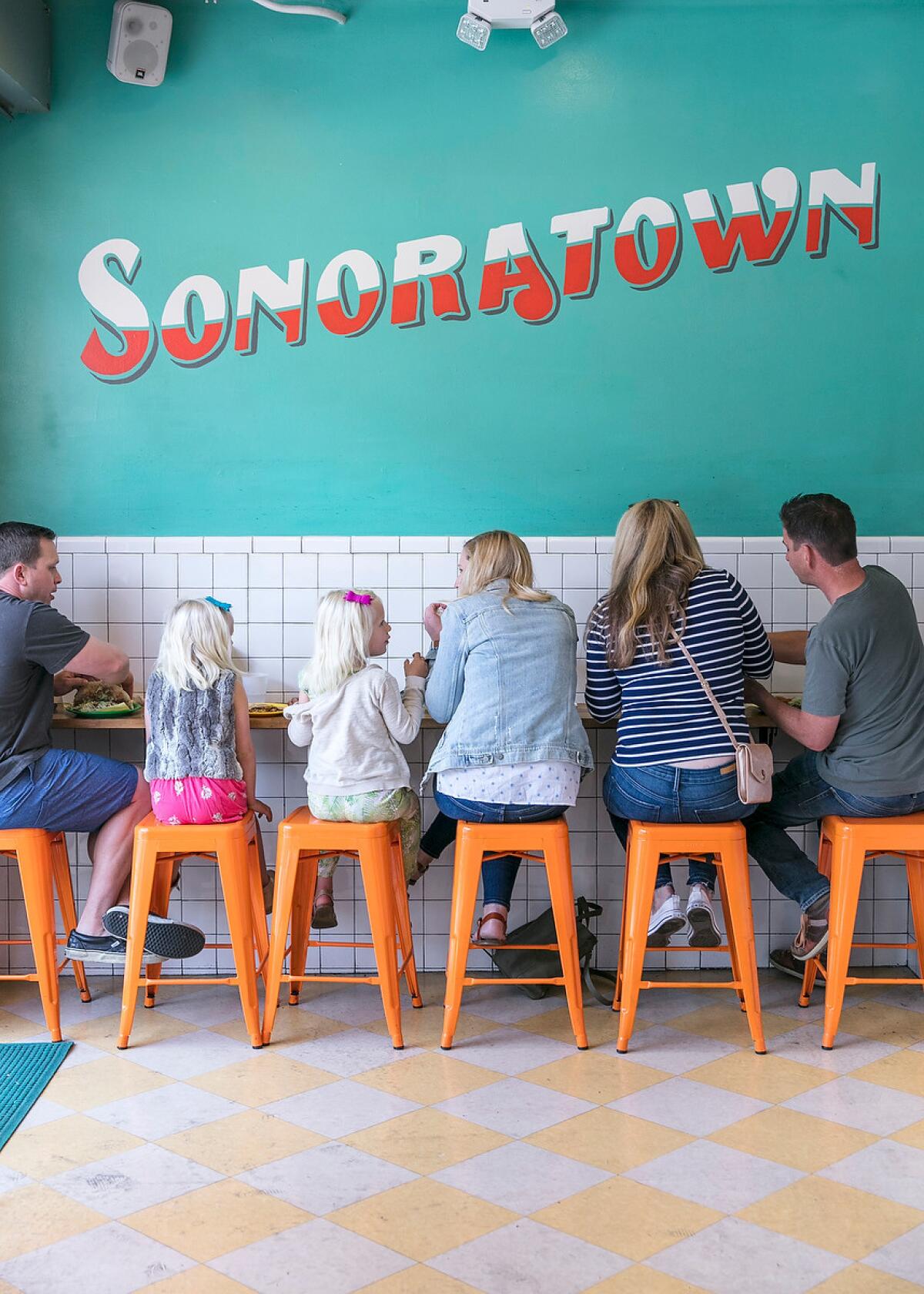
In the four years since Sonoratown opened, Feltham said she’s never shied away from reaching out to her network of restaurant owners and chefs for advice. Although the current situation is unprecedented, she’s still looking to people like her neighbor, chef-owner Charles Olalia of Ma’am Sir, who she said always puts things into perspective for her.
“I look to him for a lot of inspiration and advice,” Feltham said. “The L.A. restaurant community is really beautiful, helpful and looks out for each other. I’ve never been afraid to reach out to older, wiser chefs.”
Olalia himself has been monitoring the situation from the Philippines, where business had been put on lockdown earlier in the week.
Olalia — who still had diners at Ma’am Sir when he learned the news — said he had converted his entire menu to takeout but didn’t expect the volume of orders to be able to support the restaurant, especially given how many other businesses would now be competing for those same orders.
“Takeout is not going to be enough to cover staff and rent, no way,” he said. Of his 30 employees, he expects he’ll have to lay off “60% to 80%” of his front-of-house staff, since he would need to focus on paying his cooks to prepare food.
“It’s going to be a huge stretch just to manage finances so we can make it that two weeks,” Olalia said. “It goes much longer than that, I don’t know if we can reopen.”
Andrea Chang, Patricia Escárcega, Jenn Harris, Genevieve Ko and Garrett Snyder contributed to this report.
More to Read
Eat your way across L.A.
Get our weekly Tasting Notes newsletter for reviews, news and more.
You may occasionally receive promotional content from the Los Angeles Times.










